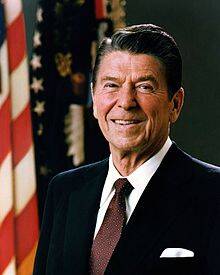If you’re a fan of political gaffes, you would have been in heaven in 1980. That’s when a major presidential candidate was ridiculed for saying, “All the waste in a year from a nuclear power plant can be stored under a desk.” Scientists also howled when he dismissed the need to limit the emission of greenhouse gases by saying, “80 percent of our air pollution stems from hydrocarbons released by vegetation” and mused that a volcanic eruption at Washington’s Mount St. Helens “has probably released more sulfur dioxide into the atmosphere than has been released in the last ten years of automobile driving or things of that kind.”
Ronald Reagan was lucky to precede the Internet, but I remember one gaffe after another when he ran for president. He was unelectable, almost as bad as Barack Obama would be in 2008, when he threw away the election by saying that “bitter” working-class Americans “cling to guns or religion.”
I can’t imagine how anyone who was paying attention in 1980 could think that gaffes determine elections. It’s actually the reverse. Everything a losing candidate says is a gaffe, and everything a winning candidate says is part of a brilliant long game. I recall that when Reagan kicked off his fall 1980 campaign by defending “states’ rights” in Mississippi, a few miles from where three civil rights workers were murdered in 1965, the question was whether he made a terrible political miscalculation or just wasn’t thinking at all. Because he won, we now assume he was cleverly blowing a dog whistle and seeding the ground for the son of his vice president to sweep the South as a Reaganist candidate two decades later.
Bill Clinton’s 1992 “Sister Souljah moment,” in which he called out a rap singer for lyrics encouraging African-Americans to kill whites, is now seen as a brilliant campaign tactic, an example of gaining votes in the middle by attacking your base. But if he had lost, the incident would probably be seen now as a major gaffe—a needless provocation that deflected attention from Clinton’s economic message and depressed voter turnout among Democrats (whatever the turnout, you can always argue that it should have been higher).
In short, I’m old enough to agree with Jonathan Bernstein, who writes at BloombergView, “The real story isn’t that politicians who flub interviews are punished by bad publicity and have to walk back their remarks. The real story comes later: The controversy goes away, and almost always leaves no trace.” Bernstein says that Republican Mitt Romney’s “gaffes” in the 2012 campaign—saying that “corporations are people” and getting caught on video writing off “47 percent” of the electorate as freeloaders—made no difference in the end.
Romney’s comments confirmed, rather than shaped, voters’ perceptions of him. And for most voters, those perceptions were inseparable from his party affiliation in the first place. Bernstein concludes that, outside of close primary elections in which inopportune statements may be the only way to distinguish ideologically similar candidates, the downside for “talking like a human being” is not as great as campaign managers think. Think back to all the dumb things said by presidents who defeated inoffensive, forgettable candidates, and he’s obviously right.








